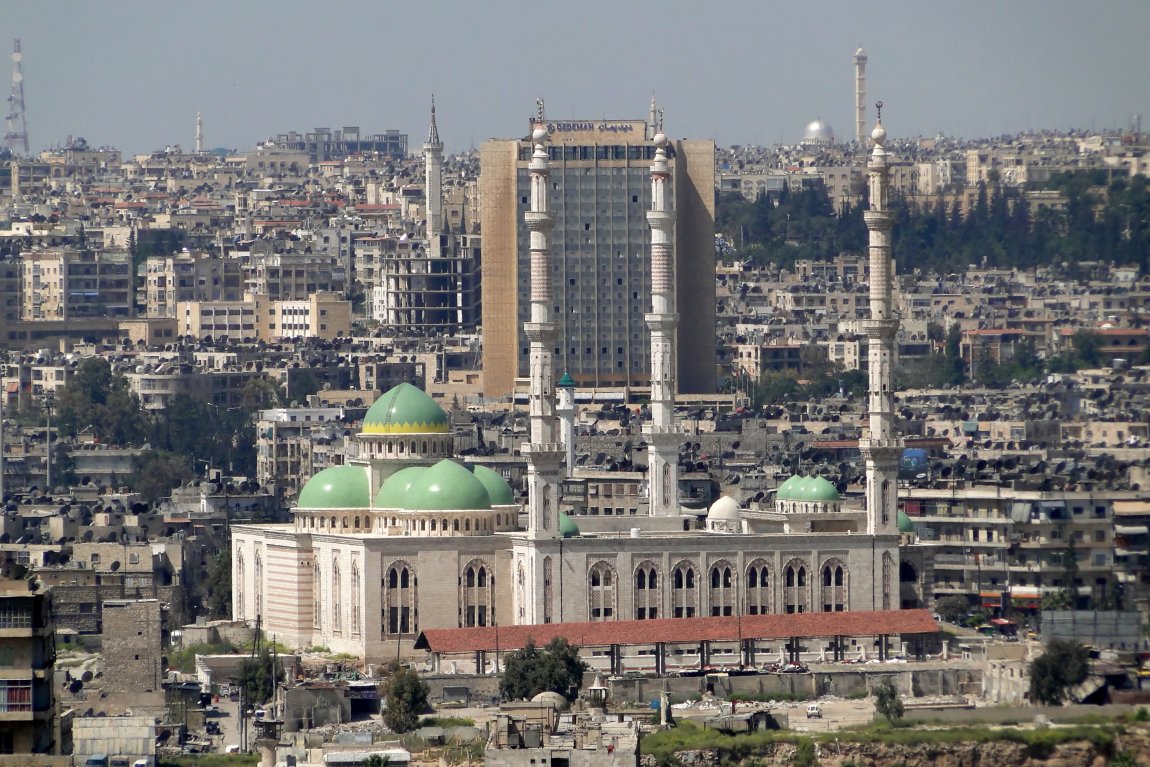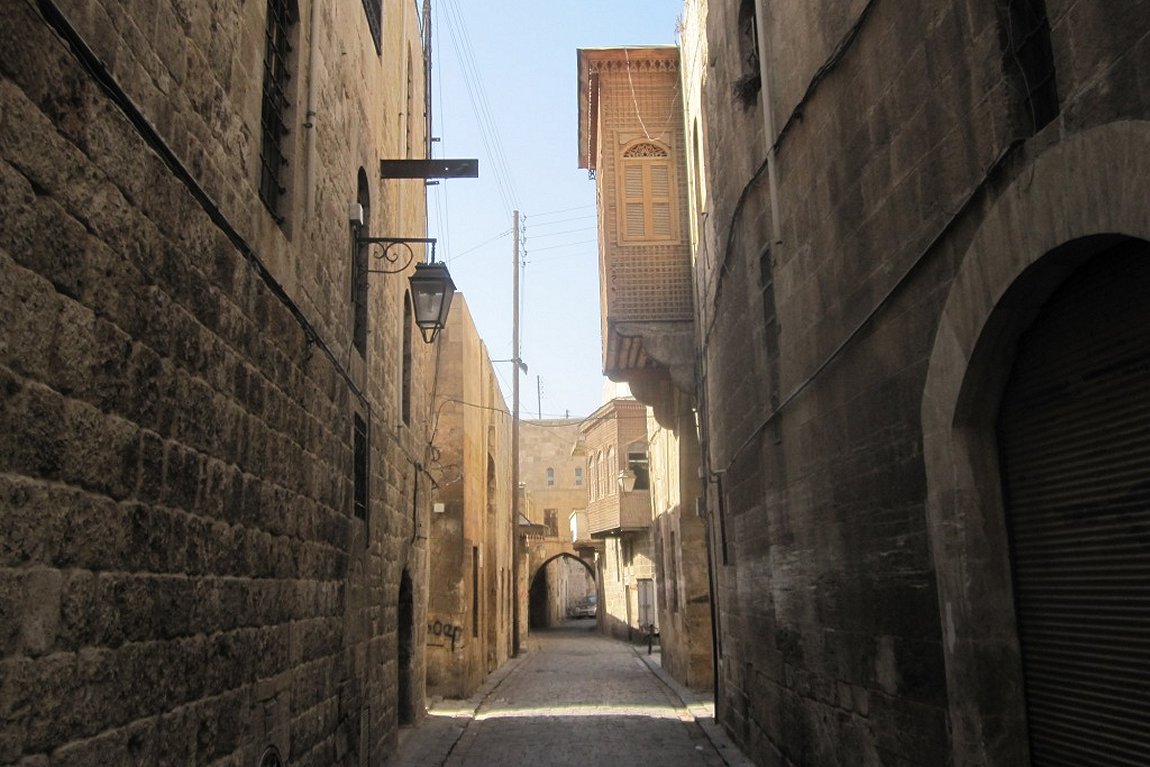 Aleppo, Syria
Aleppo, SyriaSource: https://commons.wikimedia.org/wiki/File:Aleppo_03.jpg
Author: Bernard Gagnon

Author: Bernard Gagnon

Aleppo (Arabic: ﺣﻠﺐ) is the most populous city in Syria. Located on the northwester part of the country, at an elevation of 379 m (1,243 ft), Aleppo has a population of 2.4 million people (2011 estimate). It is in the Eastern European Time zone, which is two hours ahead of Coordinated Universal Time (UTC+2), and three hours ahead during Daylight Saving Time in summer.
Aleppo experiences a semi-arid climate. The existence of high mountains such as Mount Alawites and Mount Amanus has an impact on the climate, preventing it from experiencing a Mediterranean climate. Summers in Aleppo is very hot, with high temperatures in July and August reaching 36°C (97°F) on average. On the other hand, January is a cold month, when the average low temperature drops to just 1°C (34°F). January also receives the highest precipitation, at 89 mm (3.5 in).
The city of Aleppo is said to be one of the oldest continuously inhabited cities in the world, older even than Damascus. Archaeologists have uncovered evidence of human habitation in the Aleppo area going back to 5,000 BC. In around 3,000 BC, it was the capital of an ancient kingdom. During the Old Babylonian period, it was known as Halab, and was the capital of the Yamhad Dynasty.
 President's Mosque in Aleppo
President's Mosque in AleppoSource: https://commons.wikimedia.org/wiki/File:Aleppo_04.jpg
Author: Bernard Gagnon

Author: Bernard Gagnon

Aleppo was conquered by Parshatatar, the king of the Kingdom of Mitanni, in the 15th century BC. A century later, it was captured by the Hittites, and was ruled by them until the 12th century BC, when it became the capital of the Kingdom of Arpad. Alexander the Great captured Aleppo in 333 BC. This led to a Greek settlement called Beroea established by Seleucus Nicator in Aleppo in 301-286 BC. In 64 BC, control over Beroea passed to the Romans.
As the Roman Empire split into two, Aleppo became part of the Byzantine Empire until it was conquered by the Sassanid Persians in the early 7th century. The city remained under Arab control except for brief periods, such as when Byzantine troops reoccupied it from AD 974 to 987. The Crusaders besieged Aleppo twice, in AD 1098 and 1124, but did not occupy it. The Mongols captured it in January 1260, but by September had fallen under the control of the Egyptian Mamluks. Aleppo was to face further Mongol attacks in 1280 and 1400.
 Alleyway in the old quarters of Aleppo
Alleyway in the old quarters of AleppoSource: https://commons.wikimedia.org/wiki/File:Old_alley,_Aleppo.jpg
Author: Le Grand Portage

Author: Le Grand Portage

In 1516, Aleppo became part of the Ottoman Empire. Under Ottoman rule, it became the third biggest city within the empire after Constantinople and Cairo. It also overtook Damascus as the main trading center. The fortune of the city, which reached its pinnacle in the 16th and 17th centuries, began to fade in the 18th century, when silk production in Iran - one of its major commodities - went into decline. The opening of the Suez Canal further affect Aleppo's economy.
After the Ottoman Empire collapsed at the end of World War I, Aleppo became part of the newly established Syria, which was under the French mandate. Under the French, Damascus was chosen to be the national capital, while Aleppo was made the capital of a big and wealthy state. This was a deliberate attempt by the French to ensure a balance of power and competition between the two cities.
Damascus has had an advantage over Aleppo since President Hafez Assad came to power in 1970. Being from Damascus, he had his power base there, and he used it to direct the country's resources towards Damascus, further weakening Aleppo's position as the once powerful economic and cultural center of the region. It was however named the capital of Islamic culture in 2006.
Visiting Aleppo
Aleppo is close to the Turkish border. You can enter it from Turkey. There are buses from Antioch in Turkey. The journey takes about 3 hours and costs S£250. Within the city itself, modes of transport include the minibuses, called serveece, and taxis.Places of Interest in Aleppo
- Aleppo Citadel
- Aleppo Souq
- Bimaristan Arghan
- Great Mosque of Aleppo
- Saint Simeon's Basilica
 Latest updates on Penang Travel Tips
Latest updates on Penang Travel Tips
 Map of Roads in Penang
Map of Roads in Penang
Looking for information on Penang? Use this Map of Roads in Penang to zoom in on information about Penang, brought to you road by road.
Copyright © 2003-2025 Timothy Tye. All Rights Reserved.

 Go Back
Go Back